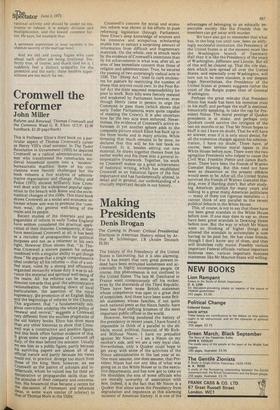Cromwell the reformer
John Miller
Reform and Renewal: Thomas Cromwell and the Common Weal G. R. Elton. (CUP, £2.90 hardback, £1.20 paperback) This is Professor Elton's third book on a particular aspect of Thomas Cromwell's career as Henry VIII's chief minister. In The Tudor Revolution in Government (1953) he depicted Cromwell as a radical administrative reformer who transformed the ramshackle medieval household system into a ' modern ' bureaucratic machine. Some of his conclusions were fiercely challenged but the book remains a fine analysis of administrative organisation and change. Policy and Police (1972) showed brilliantly how Cromwell dealt with the widespread popular opposition to the breach with Rome and the ecclesiastical changes of the 1530s. This third book shows Cromwell as a social and economic reformer whose aim was to promote the 'common weal,' the general well-being of the realm and its people. Recent studies of the theorists and propagandists of reform in early Tudor England have seldom considered the practical application of their theories. Consequently, if they have mentioned Cromwell at all, it has been as a recruiter of propagandists for political Purposes and not as a reformer in his own right. However Elton shows that, "In Thomas Cromwell a sincere passion for reform combined with a singular ability to get things done." He argues that a single comprehensive ideal underlay all his reforms — that of a unified state, ruled. by a strong and efficiently organised monarchy whose duty it was to advance the material and spiritual well-being of the realm. All his reforms can be seen as directed towards that goal: the administrative rationalisation, the breaking down of local Particularism, the assertion of the royal supremacy, the promotion of an English Bible and the beginnings of reforms in the Church. This argument, that "a fundamentally religious conviction underlay the whole policy of renewal and revival," suggests a Cromwell very different from the soulless pragmatist of the old history books. Elton has done more than any other historian to show that Cromwell was a constructive and positive figure, and this book offers further evidence of this. It gives some rare glimpses of Cromwell off duty, of the man behind the minister. Usually We see him as a public figure, partly because his surviving papers are almost all of an Official nature and partly because his views could not, in practice, diverge too much from those of the king. Here, however, we see Cromwell as the patron of scholars and intellectuals, whom he valued less for their adMinistrative or propagandist skills than for the stimulus of their company and conversation. His household thus became a centre for ALthe discussion of Protestant and reformist ideas, in some ways similar (if inferior) to that of Thomas More in the 1520s.
Cromwell's concern for social and economic reform was shown in his efforts to push reforming legislation through Parliament. Here Elton's deep knowledge of sources and his intensive and scrupulous scholarship enable him to extract a surprising amount of information from difficult and fragmentary materials. On the whole, one is struck more by the evidence of Cromwell's intentions than by his achievements in what was, after all, an area of less immediate concern than those of religion and administration. True, he secured the passing of two surprisingly radical acts in 1536. The 'Sheep Act' tried to curb enclosures for pasture by restricting the number of sheep that anyone could own. In the Poor Relief Act the state assumed responsibilility for poor to work. Both bills were fiercely resisted and weakened by Parliament however, even though Henry came in person to urge the Commons to p.ass them (which shows that early Tudor Parliaments were quite capable of resisting the Crown). It is also uncertain how far the two acts were enforced. Nevertheless, the evidence of Cromwell's active reformism in yet another sphere adds to the composite picture which Elton has built up in the three books and in many articles. While stressing that much remains to be done, he declares that this will be his last book on Cromwell. In it, besides setting out new material, he draws together themes from his earlier works and fits them into a general interpretative framework. Together, his work on Cromwell makes up a great achievement of historical writing, which has established Cromwell as an historical figure of the first importance and has fundamentally altered, in detail and in general, our understanding of a crucially important decade in our history.


































 Previous page
Previous page